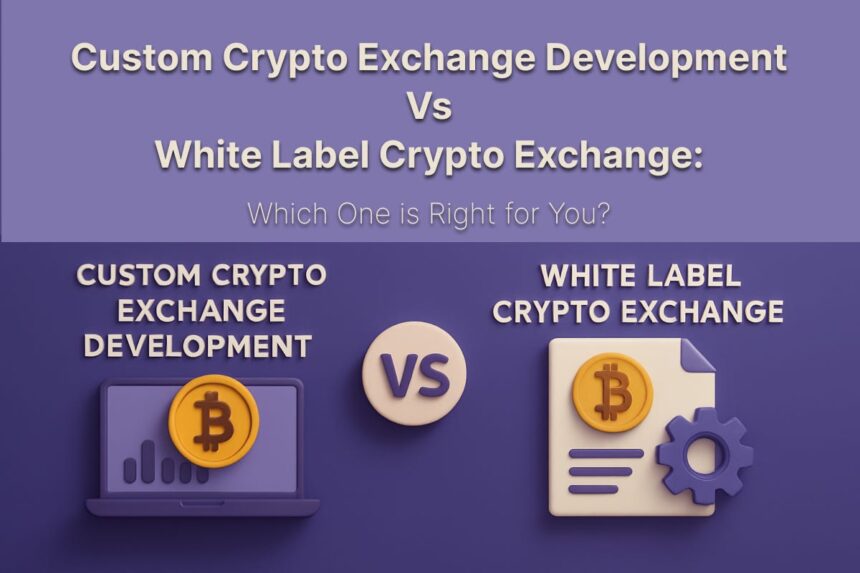The cryptocurrency market has grown rapidly, drawing attention from entrepreneurs, investors, and established businesses. With this growth comes the demand for secure and reliable platforms where users can buy, sell, and trade digital assets. If you are considering entering this space, you are likely weighing two main options: building a custom crypto exchange from scratch or opting for a white label crypto exchange solution. This blog will guide you through both approaches, helping you make an informed decision for your business.
Cryptocurrencies are no longer a niche interest. They have become a significant part of global financial systems. The surge in trading volumes and the increasing number of digital assets have led to a rise in the number of crypto exchanges. Businesses looking to capitalize on this trend often turn to a Cryptocurrency exchange Development Company for guidance and technical expertise. Choosing the right development path is crucial for long-term success.
A custom crypto exchange is a platform built from the ground up, tailored to the specific requirements and vision of the business owner. This approach involves designing, developing, and deploying a unique solution that reflects your brand, business model, and operational needs.
- Unique User Interface and Experience: Every aspect of the platform can be designed to match your brand’s identity and user expectations.
- Customizable Trading Engine: The core engine can be optimized for performance, speed, and the types of assets you wish to support.
- Integration Flexibility: You can choose which payment gateways, liquidity providers, and third-party services to integrate.
- Security Architecture: Security protocols can be designed to meet your specific compliance and risk management needs.
- Scalability: The platform can be built to support future growth, additional features, and higher transaction volumes.
- Full control over features and design
- Ability to introduce unique functionalities
- Strong brand identity
- Greater flexibility for future updates
- Higher initial development cost
- Longer time to market
- Requires a skilled development team
- Ongoing maintenance responsibility
A white label crypto exchange is a ready-made solution developed by a third-party provider. Businesses can purchase or license this platform, customize the branding, and launch quickly. The core functionalities are already built, and only minor adjustments are needed to align with your brand.
- Pre-built Trading Engine: The platform comes with a tested and reliable engine.
- Customizable Branding: You can add your logo, color schemes, and other brand elements.
- Essential Features Included: Most white label solutions offer standard features like user management, wallet integration, and basic security.
- Quick Deployment: Launching the platform takes significantly less time compared to custom development.
- Technical Support: Providers often offer ongoing support and updates.
- Lower upfront cost
- Fast time to market
- Reduced technical complexity
- Access to ongoing support
- Limited customization options
- Dependence on the provider for updates and support
- Potential for similar platforms in the market
- May not support highly specialized features
1. Business Goals and Vision
- If you have a unique business model or want to introduce innovative features, a custom exchange is the better choice.
- If your goal is to enter the market quickly and start operations with minimal hassle, a white label solution is more suitable.
2. Budget
- Custom exchanges require a significant upfront investment.
- White label solutions are more budget-friendly, especially for startups or businesses testing the waters.
3. Time Constraints
- Need to launch quickly? White label is the way to go.
- Willing to invest time for a unique product? Go custom.
4. Technical Resources
- Custom development demands a skilled team of developers, designers, and security experts.
- White label solutions reduce the need for in-house expertise.
5. Compliance and Security
- Custom development allows you to implement compliance and security measures that fit your jurisdiction and business needs.
- White label solutions come with standard compliance features, but may require additional work for specific requirements.
6. Future Growth and Flexibility
- Custom exchanges provide more room for future enhancements and expansions.
- White label platforms may have limitations in terms of adding new features or scaling up.
Custom Crypto Exchange Development Steps
- Requirement Analysis: Define your business goals, target audience, and feature set.
- Design: Create wireframes and prototypes for the user interface.
- Development: Build the trading engine, wallet integration, admin panel, and other components.
- Testing: Conduct rigorous testing for security, performance, and usability.
- Deployment: Launch the platform after thorough quality checks.
- Maintenance: Provide ongoing support, updates, and improvements.
- Provider Selection: Choose a reputable white label solution provider.
- Custom Branding: Add your logo, colors, and other brand elements.
- Configuration: Set up assets, trading pairs, and basic settings.
- Testing: Verify the platform’s functionality and security.
- Launch: Go live with your branded exchange.
- Ongoing Support: Rely on the provider for updates and technical support.
Security Considerations
Security is a top priority for any crypto exchange. Both custom and white label solutions must address common threats such as hacking, phishing, and fraud.
Custom Exchange Security
- You can implement advanced security protocols, such as multi-signature wallets, two-factor authentication, and real-time monitoring.
- Full control over the codebase allows for regular security audits and updates.
White Label Exchange Security
- Security features are built-in, but you must verify the provider’s reputation and history.
- Some providers offer additional security modules at extra cost.
Operating a crypto exchange involves navigating complex regulatory environments. Compliance requirements vary by country and region.
- Custom Exchanges: You can build compliance features specific to your jurisdiction, such as KYC/AML procedures, transaction monitoring, and reporting tools.
- White Label Exchanges: Standard compliance modules are included, but may require customization for certain regions.
Custom Exchange
- Development Cost: High, includes design, coding, testing, and deployment.
- Maintenance Cost: Ongoing, as updates and new features are developed.
- Hidden Costs: Potential for unforeseen expenses during development.
White Label Exchange
- License/Subscription Fee: Lower initial cost, often a one-time or recurring fee.
- Customization Cost: Additional fees for branding and extra features.
- Support Cost: May be included or charged separately.
Time to Market
- Custom Exchange: Typically 6–12 months or more, depending on complexity.
- White Label Exchange: As little as 2–8 weeks, depending on provider and customization needs.
Scalability and Future-Proofing
- Custom Exchange: Built to accommodate future growth, new features, and higher user volumes.
- White Label Exchange: Scalability depends on the provider’s infrastructure and willingness to support upgrades.
- You have a unique business model or want to offer specialized trading features.
- You need full control over the platform’s design, features, and security.
- Your business plans to scale rapidly and add new functionalities over time.
- You want to enter the market quickly and with minimal upfront investment.
- Your business model aligns with standard exchange features.
- You prefer to outsource technical support and maintenance.
1. Is a custom crypto exchange more secure than a white label solution?
A custom exchange allows for more targeted security measures, but the final security level depends on the development team’s expertise. White label solutions can be secure if provided by reputable companies with a strong track record.
2. Can I migrate from a white label exchange to a custom solution later?
Yes, many businesses start with a white label platform and transition to a custom solution as they grow and their needs become more complex.
3. What are the ongoing costs for both options?
Custom exchanges require ongoing investment in maintenance, security, and updates. White label solutions often include support and updates in the subscription fee, but costs can add up if you need additional features.
4. How do I choose the right development partner?
Look for a Cryptocurrency exchange Development Company with a proven portfolio, positive client testimonials, and expertise in security and compliance.
- Custom crypto exchanges offer maximum flexibility, unique branding, and control but require more time and investment.
- White label crypto exchanges are cost-effective and faster to launch but may have limitations in customization and scalability.
- Your choice should align with your business goals, budget, technical resources, and long-term vision.
Selecting between custom crypto exchange development and a white label solution is a pivotal decision. Both options have their strengths and challenges. Assess your business needs, resources, and future plans carefully before making a choice.
Ready to build your own crypto exchange? Whether you need a custom-built platform or a white label solution, codezeros can guide you through every step of the process. Reach out to our experts today and take the first step toward launching your crypto exchange with confidence.
Before you go:










